Returning to the Group Philosophy
The spread of COVID-19 has brought about huge changes in the world of a kind that occur only once in a hundred years. Obliged to change their very living patterns, people seem to have changed their behavior and values. In all of this upheaval, I have found it most important to review our purpose in society, returning to our group philosophy, “Creating Happiness and Harmony in Our Communities,” and seeing that the work of each individual in the Lawson Group contributes to our project of providing happiness in our communities.
The important point for the convenience store business is how well we can cope with change. Thus far, LAWSON stores have provided new forms of convenience to meet societies needs in each era. These have included both products and services, such as sales of deep-fried foods, installation of post boxes, printing out copies of residence certificates from in-store multifunctional copiers, and in-store kitchens. In order to grasp and respond to the small daily changes and great era-marking changes in our communities without overlooking them, we must constantly strive to change ourselves. And I believe that our driving motivation in this effort is the Group philosophy, “Creating Happiness and Harmony in Our Communities.” When each individual member of the Lawson Group performs their job with this philosophy constantly in mind, it leads to the development and happiness of our franchise stores, and to the happiness of the community. In turn, the Lawson Group will also develop. I consider it my duty to set this process in motion.
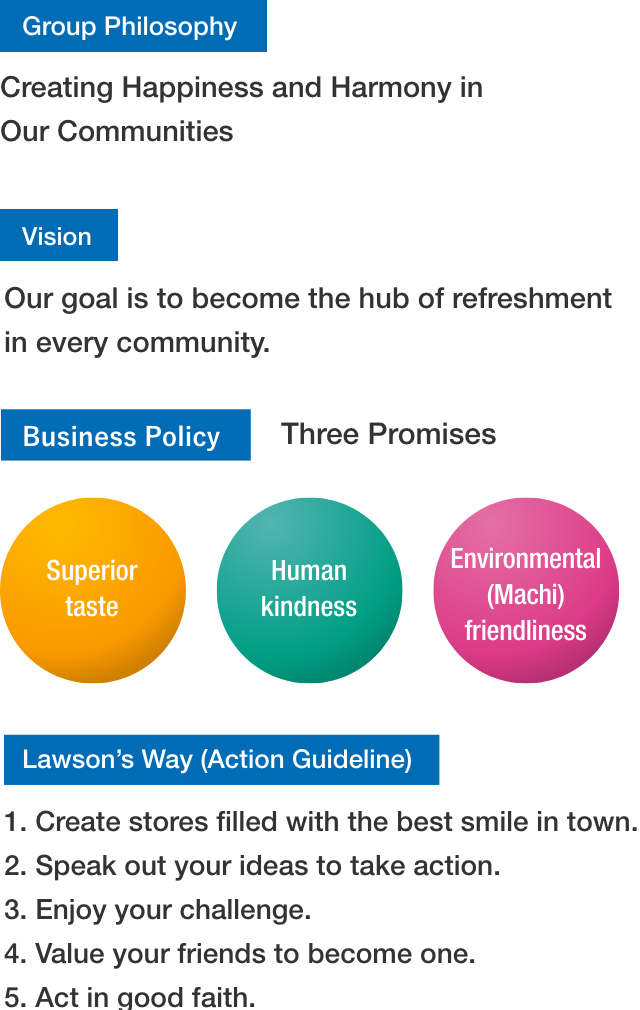
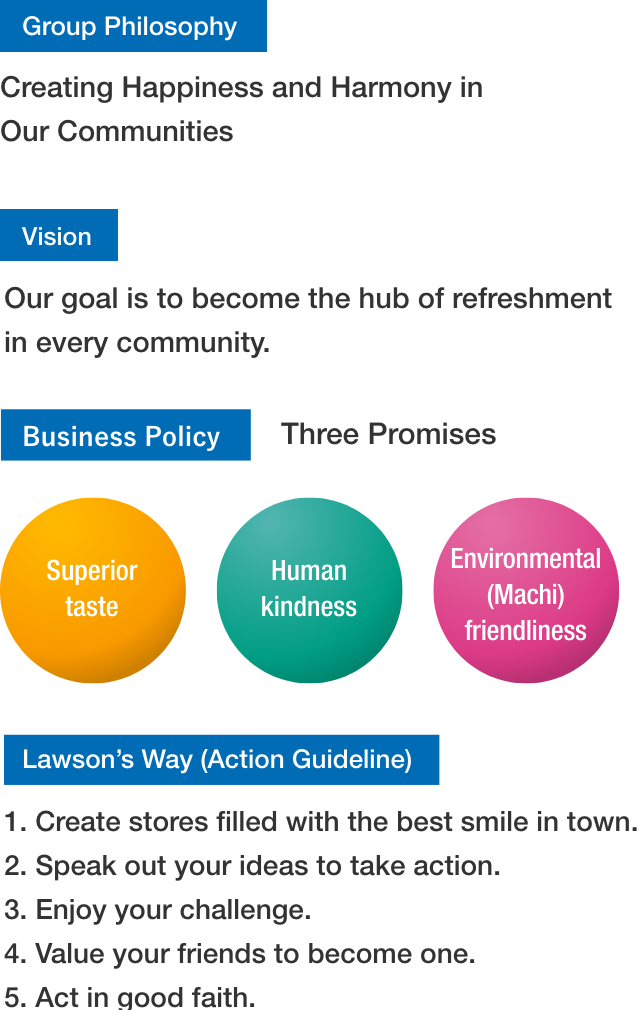
Protecting our franchise stores in order to grow together with them
Before the COVID-19 pandemic, one of the main issues that we faced was increase store productivity and earnings due to labor shortages. As a measure to address this, in 2015 we introduced a semi-automatic ordering system using artificial intelligence (AI) to relieve the burden on franchise stores, and took steps to increase the accuracy of purchasing operations and reduce the time needed for ordering. From fiscal 2017 to fiscal 2019, we accelerated IT investment in stores and focused on increasing efficiency in store operations. These efforts included distributing tablet devices to all stores to simplify store work schedule management, introducing POS cash registers with automatic change dispensers that are easy for senior and non-Japanese crew members to operate and the LAWSON Smartphone Checkout service, which allow customers to scan and pay for products using their own smartphones. I think that these initiatives have proven to be extremely beneficial.
After March 2020, the COVID-19 pandemic expanded rapidly, with the first state of emergency being declared in April, causing a sharp drop in store sales. The Lawson Group has a system for direct communication with the President, that enables franchise stores to send messages directly to me. In this time of uncertainty about the future, I have received many messages expressing anxiety through this system. We have responded by prioritizing the safety of our franchise store and store crews, and above all that of the customers who visit the stores, implementing rigorous infection-prevention measures and providing support to franchise stores that have experienced adverse operations due to a fall in earnings. During this time, we have continued to reassure our franchise stores that headquarters will protect them, and headquarters has been engaged in a team effort to support them. We have a responsibility to protect our franchise stores, but we also have a responsibility not only to continue operations in an adverse environment, but to grow our business. At the start of the pandemic, we aimed to secure the profits of franchise stores by controlling their three main costs—labor cost, food waste loss, and utility cost. The IT investments we have made to date have been highly effective in producing efficiency gains in store operations.
We have also been working to strengthen our product range to encourage customers to visit LAWSON stores for breakfast and dinner as well as lunch. As the pandemic continues, many customers hope to be able to meet their needs at a nearby LAWSON rather than a distant supermarket, and we have seen some changes in our customer base, such as an increase in customers who previously did not visit the stores. As a result, in fiscal 2020 we were able to generate store profit on par with fiscal 2019. Our franchise stores have told us that they found their efforts working together with headquarters to face the COVID-19 pandemic have borne fruit, and that they are glad to have been operating LAWSON stores.
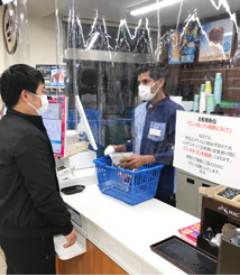 Plastic curtains over the cash register counter help to prevent infections
Plastic curtains over the cash register counter help to prevent infections
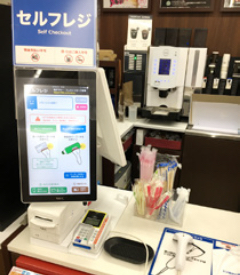 Self-checkout registers are used to avoid contact
Self-checkout registers are used to avoid contact
Realizing a new type of convenience store for the post-COVID-19 era
The Japanese economy is expected to begin recovering in earnest from the end of 2021, when further progress in vaccinations has been achieved. However, outbreaks of COVID-19 are expected to continue sporadically after that, and it is expected that a return to the pre-COVID-19 living environment will take longer.
In this market environment, I feel that the concept of convenience offered by convenience stores is gradually being reevaluated. As I mentioned before, up to now, convenience stores have grown by responding to changes in the community. Furthermore, as we overcome countless major changes, such as natural disasters, our role as part of social infrastructure has grown in importance. In addition to the environmental change caused by the COVID-19 pandemic, we are also required to cope with social changes such as a falling birthrate and aging population and climate change. In today’s continually changing world, it seems that now is really the time to consider how convenience stores should change going forward.
In our Challenge 2025 medium-term vision, formulated to mark Lawson’s 50th year in business in 2025, we have set out to adapt to the changes under the new normal, and beyond that, aim to realize “new hubs of refreshment in every community.” The Lawson Group will make a concerted effort to achieve this vision.
Convenience stores have been developed in line with a uniform standard model for the whole country, but this is going to change. Customers’ requirements differ by area, community, and store locality. By engaging with their needs properly and satisfying them, we will be able to provide a new kind of convenience.
Different stores are required to play different roles. For example, while stores located in city centers are required to provide convenience predicated mainly on speed, stores in suburban areas are used by a wide range of age groups, and they fulfill the role of watching over children and seniors. We will look to provide value that goes beyond the convenience of being able to quickly buy immediate necessities.
In addition, we are also making progress on initiatives to address social issues. At Care-focused LAWSON stores (with nursing care consultation desks for seniors) we offered consultations for booking COVID-19 vaccinations and a service providing regular medical examinations by arranging for a mobile medical examination vehicle in the car park. We also conduct mobile sales for senior customer and others who have difficulty going out to shop. These examples embody a new concept of convenience.
Our “hub of refreshment in every community” is the place that will be able to provide this new kind of convenience; it is our new vision of a convenience store expressed in Challenge 2025. I believe that advancing our transformation towards this goal will enable us to become the “No. 1 most recommended store” among our customers, society, and colleagues (franchise stores and employees, etc.), and lead to the realization of our Group philosophy, “Creating Happiness and Harmony in Our Communities.”
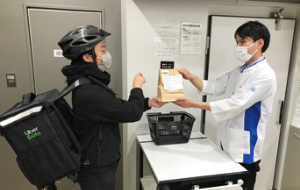 Delivery of medicine from a store by Uber Eats
Delivery of medicine from a store by Uber Eats
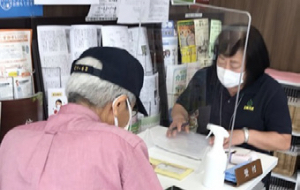 Care-focused LAWSON stores (with nursing care consultation desks for seniors) provide consultations on COVID-19 vaccination bookings
Care-focused LAWSON stores (with nursing care consultation desks for seniors) provide consultations on COVID-19 vaccination bookings
 Small-volume deli items sold as the “Machi no Deli” series.
Small-volume deli items sold as the “Machi no Deli” series.
(Availability limited to parts of the Kanto and Kinki regions)
*Images do not depict actual products
Bringing transformation to all areas through the Sweeping Transformation Executive Committee
With the popularization of remote working and the need to stay at home, customer numbers are falling at stores located in office and commercial districts. Meanwhile, stores located in residential areas have found they need to stock different products. Lawson faced a difficult period with the COVID-19 pandemic, but the increase in new demands that are different from before is also an opportunity. To increase the speed of our response to change and capture this opportunity, in September 2020 we established the Lawson Group Sweeping Transformation Executive Committee, of which I am the chairman.
The Sweeping Transformation Executive Committee plays a key role in Challenge 2025. We have established four themes for sweeping transformation; namely “transforming store displays,” “transforming profit structures,” “operating companies,” and “transforming work motivation.” The committee is made up of 12 projects related to these themes and decarbonization activities.
In the project for pursuing the ideal store format, which is related to the theme of “transforming store displays,” we are promoting renovations aimed at creating stores where people can easily purchase essential daily goods. This is in response to an increase in needs for shopping close to home and having meals at home following the popularization of remote working and the need to stay at home. To begin, we renovated 500 stores as pilot renovated stores starting in May 2021. We are gathering various data from these stores to use in subsequent store renovations. For example, we are conducting analysis of the data to determine how the various conditions in the store, such as its equipment, can cause differences in popular selling products and customer numbers in stores with the same location conditions. Using this information, we aim to renovate each store in the optimal way based on data to achieve a better effect, rather than conducting a uniform store renovation program based on a set formula. Furthermore, since we have achieved strong improvements in daily sales at our pilot renovated stores, in fiscal 2021 we plan to expand the renovation program to up to 5,000 stores. Moreover, for the Machikado Chubo in-store kitchens project, which is also related to “transforming store displays,” we will expand our continually growing Machikado Chubo in-store kitchen products in response to demand from customers who have found fewer opportunities to eat out due to COVID-19. The project allows us to prepare products in the in-store kitchen and provide them right there so that we can respond flexibly to customer demand. As of the end of July 2021, we had installed kitchens in 7,000 stores, and we plan to expand this to up to 8,400 stores during fiscal 2021.
We will also focus our efforts on daily necessities. In convenience stores to date, demand for daily necessities has been centered primarily on urgent purchases. We would like to change the demand for daily necessities to purchases by preference. As part of this effort, we have launched a trial selling MUJI products at around 100 stores.
In our initiatives for “transforming profit structures,” we are working to eliminate waste to improve the profit structure and to make use of existing assets to generate earnings. In our customer-centric supply chain reform project, we are harnessing the power of IT and AI to help us eliminate losses due to waste at various points in the supply chain and build an optimal logistics network. In our project for making unified use of Group data, we are enabling each individual Group company’s own customer data to be used in a unified form to enable deeper understanding of customers so that we can meet their individual needs.
Under the theme of “transforming work motivation,” we are reexamining our evaluation systems to enhance employee motivation to take on challenges and promoting interaction between Group employees, among other measures, aiming to improve job satisfaction among Lawson Group employees, our important human capital.
 Sales of daily frozen foods
Sales of daily frozen foods
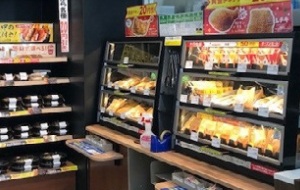 Self-service sales of individually packaged deep-fried deli items
Self-service sales of individually packaged deep-fried deli items
 In-store food preparation service Machikado Chubo
In-store food preparation service Machikado Chubo
Bringing transformation to all areas through the Sweeping Transformation Executive Committee
Organizational structure
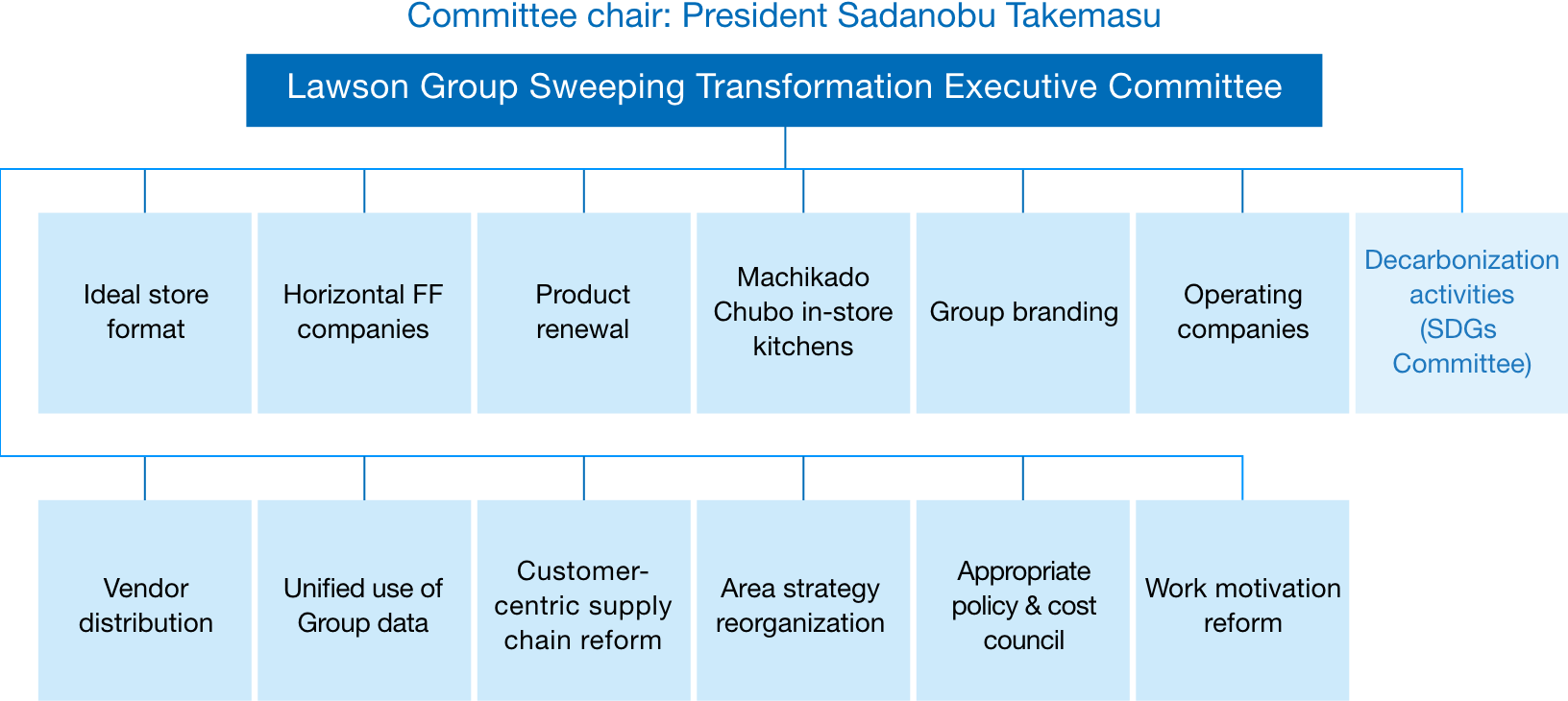
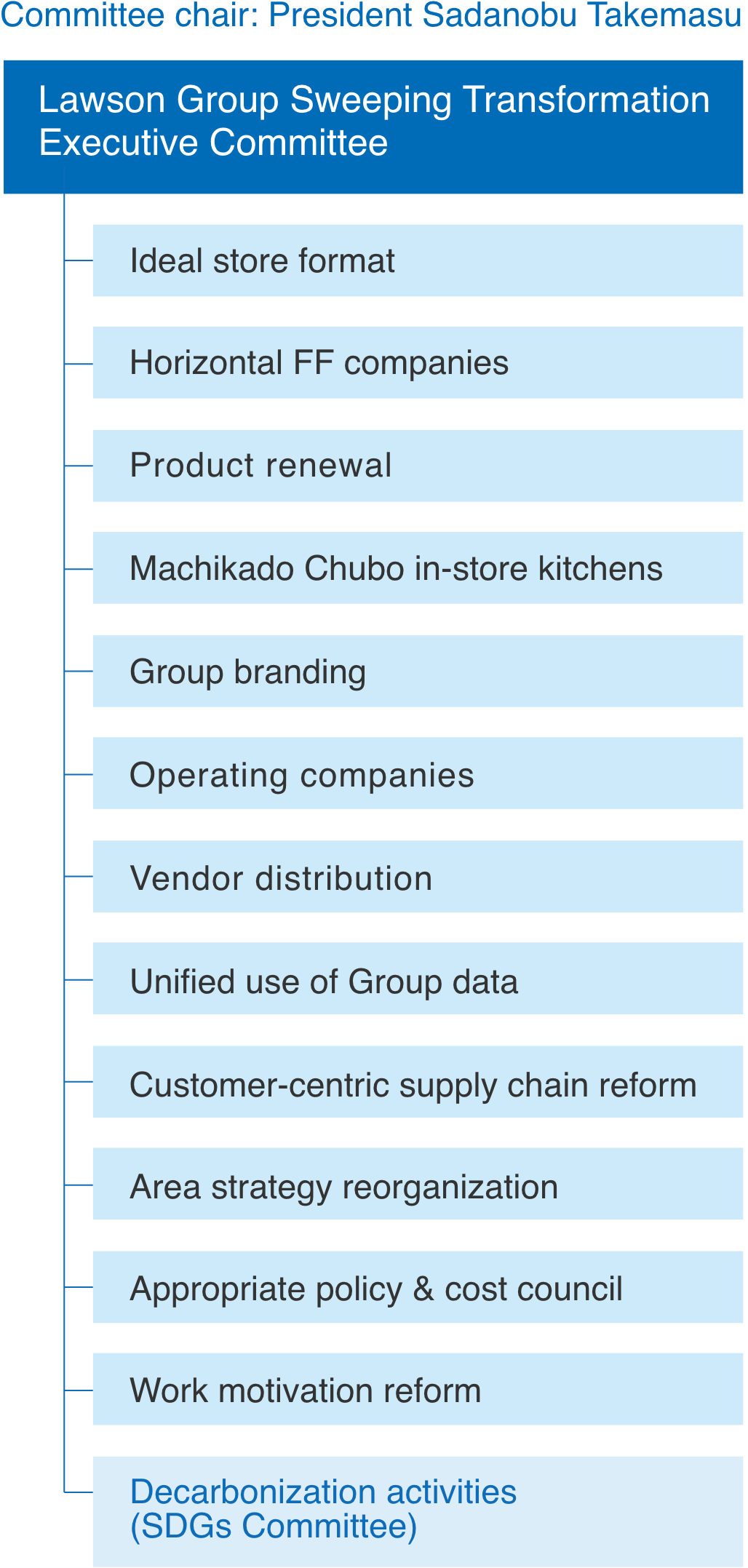
Main items
- Transforming store displays
- Create stores where people come to purposely shop for essential daily goods that satisfy new lifestyles and values.
- Transforming profit structures
- Improve profitability of franchise stores, HQ, and operating companies by reviewing costs and striving to increase revenue.
- Operating companies
- Seek to provide new value that horizontally combines the Group’s overall strengths.
- Transforming work motivation
- Continually reform work motivating factors for all franchise store, HQ and Group company employees.
Taking on challenges for the entire Lawson Group
The Sweeping Transformation Executive Committee will also promote initiatives to encourage the sustainable growth of our operating companies in each segment. In the China business, the number of stores exceeded 3,000 in fiscal 2020, and business became profitable on an operating profit basis. In 2021, we have exceeded 4,000 stores, making us the largest Japanese convenience store chain in China. Our earning capability is also growing together with increases in store numbers and local recognition. However, the number of stores per population is still low compared to Japan, and we believe there is room to open more stores going forward. During the COVID-19 pandemic, China required convenience stores to provide social infrastructure functions. By expanding our store network into areas where it is needed, we aim to become an essential presence for Chinese customers. So far, we have increased the number of stores by opening them on our own and through area license agreements with local partners; now however, we are taking on the challenge of expanding our business even further in cooperation with leading local business partners.
In our Seijo Ishii business, profit increased again in fiscal 2020 as sales of fresh foods and other products grew atop an increase in supermarket demand due to the COVID-19 pandemic, while our strong lineup of in-house deli items also performed well. With the start of operations in our new central kitchen plant in the spring of 2022, we will expand our store network and aim for further growth. In the entertainment-related business, despite restrictions on holding events due to the pandemic, the business is on a recovery trend, as we have increased our handling of tickets for viewing live online events and responded to demand associated with staying at home using e-commerce. Looking ahead, we will take up the challenge of building an entertainment business designed for the new normal era, including the use of online live streaming and so forth. In the cinema complex business, we will continue to provide exciting entertainment to customers going forward based on our success in providing a rare space where customers were able to enjoy entertainment during the pandemic. In the financial services business, we will continue to expand the number of partner financial institutions while providing various services using ATMs and ATM payment networks. We will continue to expand these services and while working to strengthen our earnings base with new initiatives.
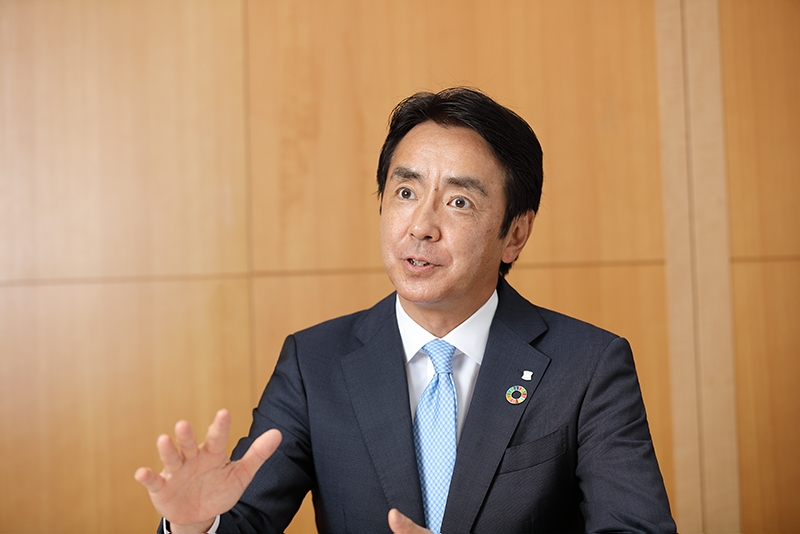
DX to contribute to solving social issues
While continuing our existing initiatives to increase the efficiency of store operations, we believe we should also work to optimize the overall supply chain with a view to minimizing food waste losses, mainly though the customer-centric supply chain reform project that I mentioned, through the further use of digital transformation (DX) and AI. Combining the supply chain expertise of Mitsubishi Corporation with the digital technologies of its alliance partner, Nippon Telegraph and Telephone Corporation, we aim to optimize our supply chain with regard to food ordering and so forth. In June 2021, we started a demonstration experiment of a discount sale recommendation service using AI in the Tohoku area. We are also making progress on a plan for customers who use KDDI smartphones, using their smartphone position data and LAWSON purchase history to predict when they are likely to visit a store, then notify them of discounts on rice balls and sandwiches nearing their sell-by deadlines around that time. We will be even more determined to completely sell all of our products than before. We consider DX to be important not only in the pursuit of efficiency gains, convenience, and improved earnings, but also for resolving social and environmental issues, and we will continue to work proactively with DX going forward.
Challenge 2025 performance indicators
The performance indicators for Challenge 2025 include ROE of 15% or higher and EPS of 500 yen. The business environment has changed dramatically during the COVID-19 pandemic, and sales have also been affected. However, we will respond to this change by seeking to transform it into an opportunity. I believe that responding to change will dramatically expand our potential. We expected the results of several years of aggressive IT investment to begin to manifest from fiscal 2020; but the spread of COVID-19 has made it difficult to gauge the effect. Nevertheless, looking at it from a different perspective, we see that a completely different effect has occurred. We completed installation of POS cash registers with automatic change dispensers at all stores in 2019. Initially, we expected these to be effective mainly in responding to labor shortages by increasing the accuracy and efficiency of payments at the checkout. As contact between people became an issue during the pandemic, these cash registers were able to be used as self-service checkouts, enabling us to meet the needs of our customers. By responding sensitively to these kinds of changes and keeping up with demand, we will enable customers to continue using our stores. The accumulation of small gains will drive overall sales growth. The task of rapidly implementing our response to such changes falls to the Sweeping Transformation Executive Committee. I think that the key points in meeting our Challenge 2025 performance indicators will be the degree to which we can grasp changes in our communities and the degree to which our individual stores can respond flexibly to these changes.
Challenge 2025 Performance indicators
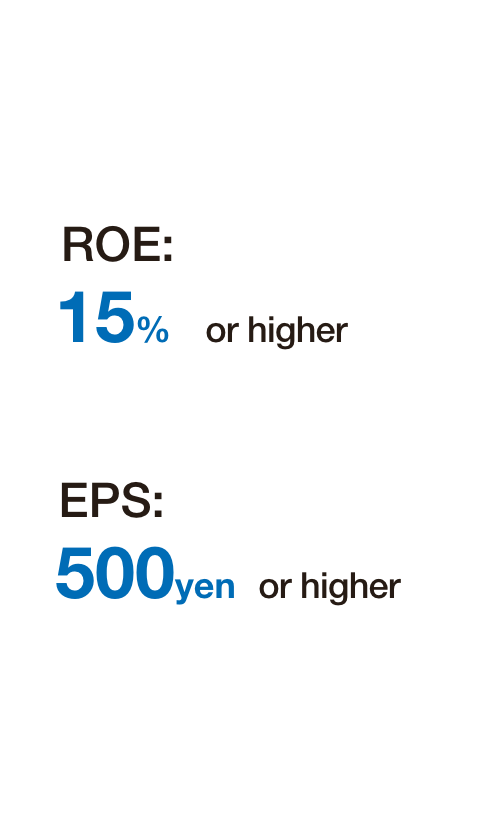
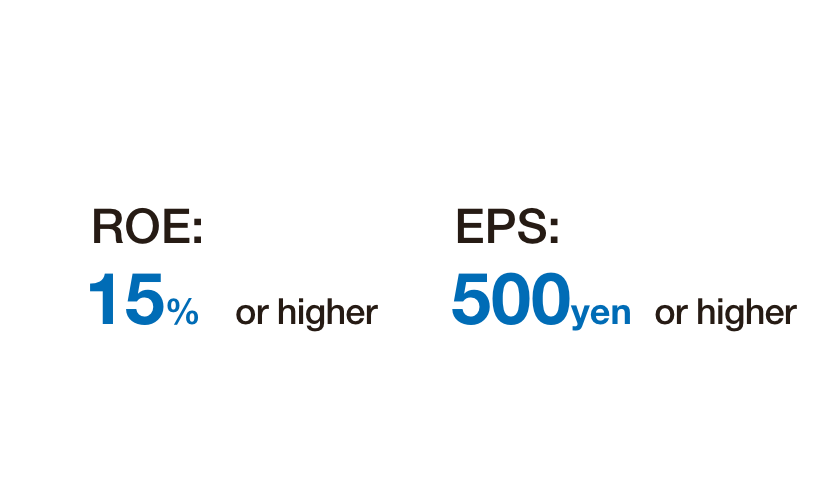 ESG-focused management
ESG-focused management
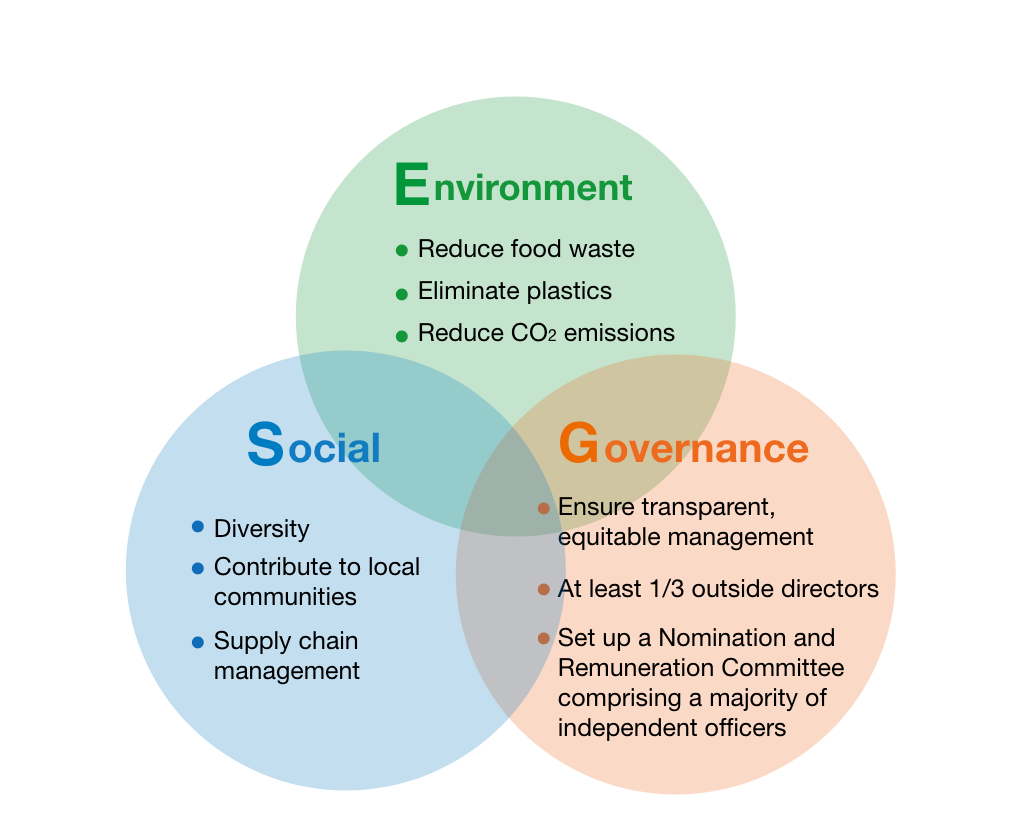
Realizing sustainable growth and a sustainable society
To realize the sustainable growth of the Lawson Group and a sustainable society, Lawson established the SDGs Committee on March 1, 2019, and on March 1, 2021 the Company established the position of Chief Sustainability Officer (CSO), to which I have been appointed. We have stated three promises in our business policy: “Overwhelmingly Delicious,” “Human Kindness” and “Environmental (Machi) Friendliness.” Through our initiatives to fulfill these commitments, we are working to provide solutions for our six material issues and the corresponding Sustainable Development Goals (SDGs). Furthermore, to help realize the Lawsons Group’s sustainable growth and a sustainable society, under Challenge 2025 we intend to practice ESG-focused management. We will incorporate these three perspectives—environmental, social, and governance—in the strategic selection of investments within our activities for reaching our performance indicators.
Finally, I have around 180,000 colleagues in the Lawson Group. I want to make our organization one where my colleagues and I can recognize one another’s value and encourage one another to develop. There are many unique ways that Lawson can contribute to realizing a sustainable society, both in Japan and globally, using its network of real-world stores in each community. We are committed to our ongoing challenge of creating happiness and harmony in our communities.



 Plastic curtains over the cash register counter help to prevent infections
Plastic curtains over the cash register counter help to prevent infections
 Self-checkout registers are used to avoid contact
Self-checkout registers are used to avoid contact
 Delivery of medicine from a store by Uber Eats
Delivery of medicine from a store by Uber Eats
 Care-focused LAWSON stores (with nursing care consultation desks for seniors) provide consultations on COVID-19 vaccination bookings
Care-focused LAWSON stores (with nursing care consultation desks for seniors) provide consultations on COVID-19 vaccination bookings
 Small-volume deli items sold as the “Machi no Deli” series.
Small-volume deli items sold as the “Machi no Deli” series.  Sales of daily frozen foods
Sales of daily frozen foods
 Self-service sales of individually packaged deep-fried deli items
Self-service sales of individually packaged deep-fried deli items
 In-store food preparation service Machikado Chubo
In-store food preparation service Machikado Chubo




 ESG-focused management
ESG-focused management
